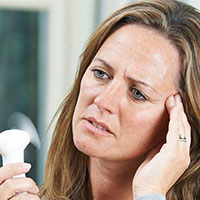Gary Glitter programme Tuesday

HRT shortage - what you need to know

Many women have been experiencing problems with obtaining their HRT which, understandably, is causing a huge amount of frustration amongst these women and also healthcare professionals. With several widely prescribed brands of HRT set to remain out of stock for the next few months, GP and Menopause Specialist, Dr Louise Newson, looks at what you can do if you are affected by the HRT shortage.
Get menopause advice straight to your inbox...
Why is there an HRT shortage?
The reasons for this are unclear; there has been some blame on Brexit, some have blamed manufacturing issues, and there has also been an increase in the prescribing of hormone replacement therapy (HRT) recently.
Which types of HRT are affected?
The types of HRT affected by this shortage are mostly various tablet forms of combination preparations containing estrogen and a type of progestogen. Some combination patches are also affected.
This shortage can actually be used as an opportunity to review the dose and type of HRT you are taking and decide whether this needs to be changed and even improved upon. If you're having trouble sourcing HRT from your usual pharmacy, it can be worth trying an online supplier as these often stock a broader range of medications.
What is HRT?

There are many different types and doses of HRT available, so it is really important to be given the right one for you.
All types of HRT contain oestrogen, which works to replace the oestrogen that your ovaries no longer makes after the menopause. Taking HRT can really improve your symptoms (and quality of life) and also lead to a greater improvement in your heart and bone health. The best time to start HRT is when your periods are changing and you experience symptoms (i.e. when you are perimenopausal).
Is HRT safe?
HRT is actually much safer than most people realise. For the vast majority of women, the benefits of HRT outweigh the risks. More information about HRT is available here - and body identical HRT here.
What type of HRT should I take?
There is now robust evidence which shows that taking body identical HRT derived from the yam (a root vegetable) is the best type of HRT for most women. I have written an Easy HRT Prescribing Guide which many GPs tell me they find really useful. Numerous women have told me they have printed this out and given it to their GPs too.
Receive our top threads daily...
What form of HRT should I use?
There are many advantages of using the oestrogen as a patch of gel instead of a tablet and having the progestogen as micronised progesterone oral capsule (Utrogestan in the UK) or having a Mirena coil.
The oestrogen that I usually prescribe for women is called 17 beta-estradiol. This is a 'body identical' oestrogen, so has the same molecular structure as the oestrogen in our bodies before the menopause.
It is safer to have the oestrogen as a patch or gel, as this is absorbed directly through our skin into our bloodstream and has less side effects and risks. These types of oestrogen can be given to women who suffer with migraines and those with a higher risk of blood clot.
There is a very small risk of clot with taking oestrogen as a tablet. For most women their risk of clot is low, so this increase does not put them at undue risk, but many doctors are now preferring to prescribe patches or gels.
The type of progestogen (needed for women who have their womb) I usually recommend is called 'micronised' progesterone (Utrogestan). This is a 'body identical' progestogen as it has the same molecular structure as the progesterone in our bodies. This means it is usually associated with fewer side effects than other types of progestogens. Side effects of older progestogens can include bloating, weight gain, spots and mood swings.
The additional advantage of micronised progesterone is there is no increased risk of breast cancer for the first five years of taking it. After this time the risks of breast cancer are very low and seem to be lower than the risk for a woman taking the older types of progestogen. However, even with other types of combined HRT the risk of breast cancer is extremely low. Women who are overweight or drink around a couple of glasses of wine a night actually have a greater risk of breast cancer than women taking combined HRT.
Why won't my doctor prescribe HRT?

Despite all the national and international menopause guidelines clearly stating that most women benefit from taking HRT - and the fact that the risks with taking HRT are very low - many women still find that their GPs are refusing to give them HRT.
Why is this? My research into management of menopause by healthcare professionals revealed a number of misconceptions, which might be part of the problem. While over 90% of the healthcare professionsal surveyed correctly believed that HRT reduces the risk of osteoporosis, knowledge of the effect of HRT on breast cancer risk was more variable. Around a third incorrectly thought that oestrogen-only HRT risk increases breast cancer risk.
In addition, the majority had given or offered anti-depressants to menopausal women suffering from low mood. Not surprising, then, that a recent survey I undertook of nearly 2,000 women found that 66% of women have inappropriately been given or offered antidepressants. There is no evidence that antidepressants improve the low mood associated with the perimenopause and menopause.
If you have had a negative experience obtaining HRT and do not feel confident approaching your GP then this letter may help you. This has been used with success by many women who are struggling with their GP prescribing HRT.
I am hoping the shortage of HRT can be a positive experience to learn new facts about HRT and be given the right type for you.
What's your experience? Have your say on the thread here.
This page has been written by Dr Louise Newson, a doctor specialising in menopause. Her new app will be launched in spring and people can sign up for more information at www.balance-app.com.
If you have any questions about menopause or HRT, please visit your doctor.
Images: Shutterstock


